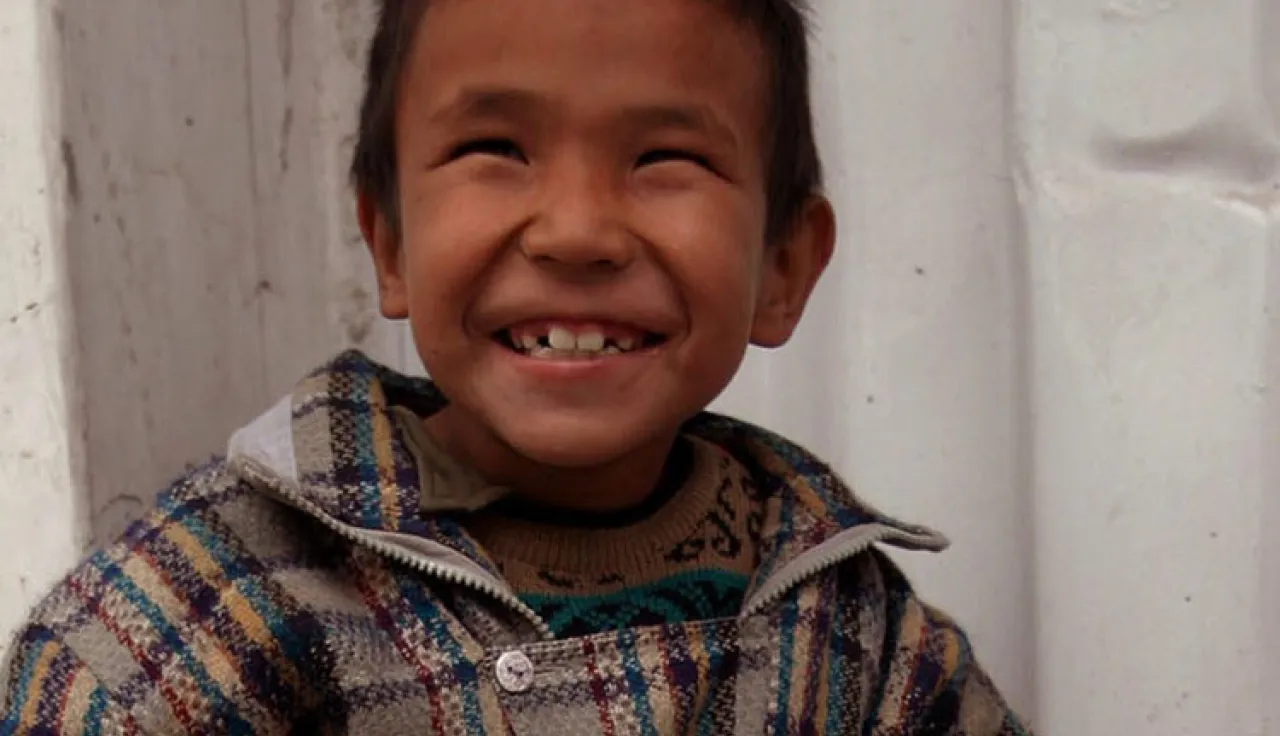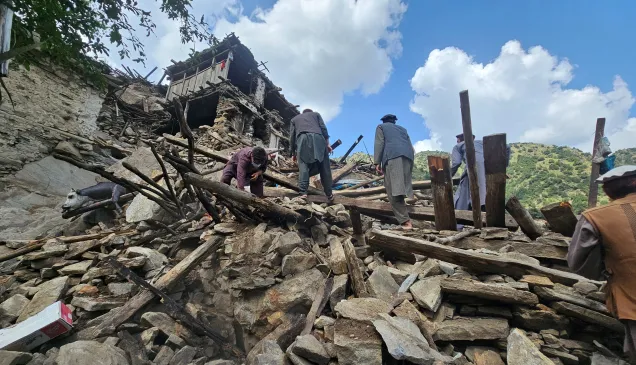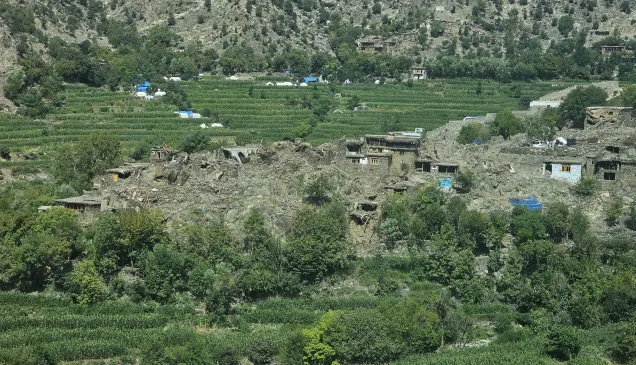Afghanistan: Facts and figures for 2015

Aismat Jan, an Afghan boy, sits outside and eats lunch at the ICRC physical rehabilitation centre in Kabul. EPA/Syed Jan Sabawoon
A summary of activities carried out by the ICRC in Afghanistan from January to March this year.
Visiting detainees and maintaining family contact
The ICRC visits detainees in Afghanistan, monitoring their conditions and treatment. We also help family members separated by conflict to stay in touch, and endeavour to trace missing persons.
During the first quarter, the ICRC:
- made over 30 visits to 21 detention centres (housing 18,159 detainees);
- followed up with 325 people arrested due to the conflict, 173 were visited for the first time;
- helped 18 released detainees to travel home;
- collected more than 520 Red Cross messages between detainees and their families and distributed nearly 350, with support from Afghan Red Crescent;
- assisted families to make 612 phone calls to relatives detained in Parwan Detention and Afghan National Detention Pul-i-Charkhi facility;
- organized 433 visits between relatives and detainees in Bagram;
- received 36 enquiries from families about arrested relatives and resolved 30 of the 84 requests (from abroad) to find missing relatives;
- returned the remains of 356 fighters and civilians to their families.
Supporting health care
The ICRC supports the 444-bed Mirwais Regional Hospital in Kandahar, supplying medicine, medical equipment, and providing diagnostic and critical services such as surgery, obstetrics and paediatrics.
In north-western Afghanistan, the ICRC supports the 150-bed Sheberghan Hospital, delivering medical, non-medical and logistical supplies, including drugs, cleaning materials and medical equipment.
From January to March, we:
- supported Mirwais and Sheberghan Hospitals, which admitted 16,178 patients to surgical, medical, obstetrics and gynaecology wards, carried out 4,686 surgical operations, and treated 101,787 outpatients;
- provided monthly medical and non-medical supplies to Koringal Sub-Health Centre in eastern Afghanistan;
- made over 70 visits to detention centres, assessing the health of detainees;
- provided medicine and support to 47 Afghan Red Crescent clinics and to health and first-aid volunteers delivering health care to people in conflict-affected areas - in total the clinics conducted 222,770 outpatients consultations and administered 128,967 doses of vaccine for routine childhood diseases;
- supported the Ministry of Public Health's clinic for detainees in Sarposa prison, Kandahar and the Herat Provincial Prison;
- granted 7 financial donations to local hospitals, helping them respond to emergencies;
- delivered 39 first-aid training sessions to 527 medical personnel;
- transported 345 wounded people to medical centres.
Providing limb-fitting and physical rehabilitation services
The ICRC runs seven prosthetic/orthotic centres in Afghanistan, providing rehabilitation services for amputees and other people with disabilities, vocational training, micro-credit loans and home education for children.
Rehabilitation centre workers:
- registered 2,256 new patients, of whom 279 were amputees;
- assisted 30,714 patients across the seven centers;
- constructed 4,739 prostheses and orthoses;
- provided 62,144 physiotherapy treatments to patients;
- granted micro-credit loans to nearly 200 patients to start their own small businesses;
- provided ongoing vocational training to 149 patients, 22 have graduated;
- made 1,853 home visits, assisting more than 1,600 patients with spinal cord injuries.
Delivering aid
The ICRC, in partnership with the Afghan Red Crescent Society (ARCS), provided emergency aid, helped improve infrastructure such as irrigation channels, protection walls and water gates, and supported micro economic initiatives.
In the first quarter:
- 34,550 people displaced by conflict or natural disaster received basic aid, such as food;
- 247 people benefited from 9 cash-for-work projects, enabling households to better protect and cultivate their land;
- 23 workers received basic veterinary kits and training on animal health services, improving the health and productivity of the animals and increasing food production;
- 16 households (187 people) received cash assistance for emergency medical treatment and funeral expenses for family members injured or killed in the conflict.
Improving water and sanitation services
ICRC engineers work closely with local water authorities on various rural water projects, promoting improved sanitation and hygiene in prisons, detention centres and juvenile rehabilitation centres.
In January, February and March:
- nearly 80,000 people received water for household needs in rural areas of Parwan, Kapisa, Nangarhar, Herat, Farah, and Faryab provinces;
- over 5,000 detainees had living conditions improved following upgrades to detention facility infrastructure;
- approximately 4,400 detainees benefited from better access to water facilities in Pul-i-Charkhi Central Prison;
- around 4,000 detainees benefitted from increased maintenance of general facilities at Balkh and Herat Provincial Prisons;
- more than 40 employees and 100 patients (and relatives) received daily treatment at the new extension of the physical rehabilitation centre in Lashkar Gah.
Partnering with Afghan Red Crescent Society
The ICRC works closely with the Afghan Red Crescent Society (ARCS), providing the organization with technical and financial assistance to help it deliver services to the community and implement a range of humanitarian programmes.
Together, the ICRC and the ARCS have:
- commenced work on eight activities and projects, based on the signed partnership framework agreement (2015 – 2017) and a commitment on joint delivery of humanitarian assistance;
- organized the first quarterly steering group meeting for Emergency Preparedness and Response (EPR) and Strengthening National Society General and Statutory Support (SNSGEN) programmes at Afghan Red Crescent, with action plans and fund requests sent for follow-up;
- shared an overview onthe use and protection the red cross and red crescent emblems with the Legislation Department of Ministry of Justice for further process;
- conducted a two-day workshop on Branch Organizational Capacity Assessment (BOCA), developing an operational plan to strengthen and sustain service delivery.
Promoting compliance with international humanitarian law
The ICRC promotes compliance with international humanitarian law (IHL), reminding warring parties of their obligation to protect civilians and spreading knowledge of IHL among civil society groups, government bodies and academics.
In the first quarter, the ICRC:
- conducted briefings for more than 10,800 people, including civil society members, religious scholars, political authorities, members of the national armed forces, the National Directorate of Security, the armed opposition and people receiving ICRC aid.



